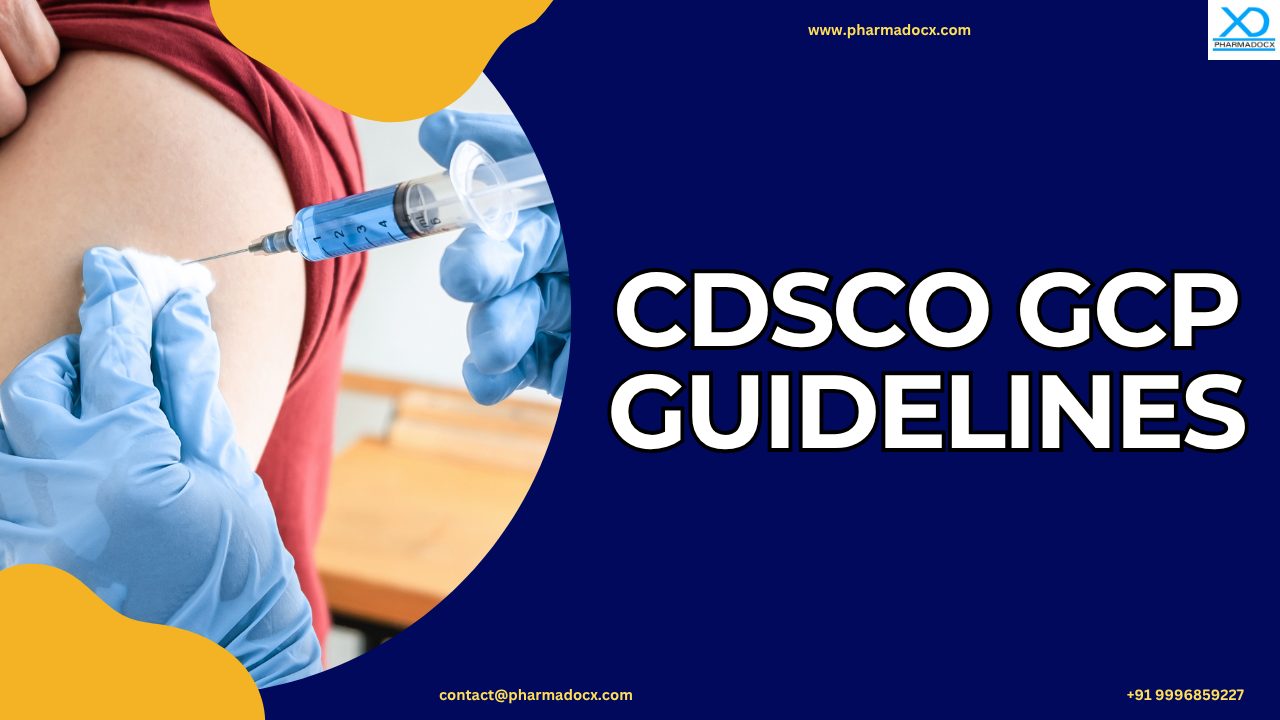Good clinical practice (GCP) provides guidelines for designing, conducting, recording, and reporting clinical trials that involve human participants. GCP sets standards that need to be followed by conducting clinical trials. It ensures that the rights, safety, and well-being of study participants are protected. Additionally, it ensures the data collected are credible and accurate. The current global standard is ICH GCP guidelines. Central Drugs Standard Control Organisation (CDSCO) is the apex regulatory body for all drugs and medical devices in the Indian market. Based on international standards, India has formulated its own CDSCO GCP guidelines for conducting clinical trials in India. The guidelines are essential step forward in regulating clinical trials in India. They aim to enhance the integrity and quality of clinical research. Moreover, CDSCO GCP guidelines are expected to facilitate medical advancements, improve patient care, and bolster public confidence in clinical research.
What are good clinical practices (GCP)?
Good clinical practices (GCP) is an international standard for ethically and scientifically conducting clinical trials. It has a crucial role in preserving the consent rights and health of participants in a trial process. GCP provides guidelines for every step in the clinical trial from trial design to data reporting. Key aspects of GCP are as follows:
- Trial protocol adherence: GCP provides guidelines for designing, conducting, recording, and reporting clinical trials that involve human participants. The clinical trials must be conducted as per scientifically sound and approved protocol.
- Qualified personnel requirement: The clinical trial investigators and staff must be appropriately trained and qualified for conducting the trial.
- Trial data integrity: Accurate documentation of the trial and secure handling of data are essential.
- Monitoring and auditing: Regular audit of trial should be performed to ensure compliance and detect issues early on.
- Ethical conduct: Trials must be conducted per ethical principles and guidelines. Principles of Declaration of Helsinki protecting the participant’s rights in medical research involving human subjects should be upheld while conducting clinical trials.
- Informed consent: Participants must be fully informed of the clinical trial and voluntarily agree to participate. Furthermore, informed consent should be obtained from the participants.
What is ICH GCP?
International Council for Harmonisation Good Clinical Practice (ICH GCP) sets the international ethical and scientific quality standards for conducting clinical trials involving human participants. ICH GCP is a clear set of guidelines for investigators, sponsors, and other stakeholders involved in clinical trials. ICH GCP provides a crucial framework for ensuring integrity and credibility of clinical trial data. Additionally, guidelines protecting the trial participants’ rights, safety, and well-being are a critical component of ICH GCP. These guidelines serve as a benchmark for conducting clinical trials, ensuring consistency and quality across different research settings. Notably, informed consent, data integrity, and participant safety form the crux of ICH GCP. Hence, understanding and implementing ICH GCP in clinical trials is vital for researchers, healthcare professionals, and regulatory bodies. We have discussed the 13 rules of ICH GCP:
- Medicinal product information: Adequate information on the medical product should be made available to provide enough evidence to start the clinical trial.
- Study protocol compliance: Trial researchers are expected to follow the protocols submitted to the committee before starting the trial. Strict compliance with study protocol is important for data integrity, participant safety, and accountability.
- Medical decisions: Licensed professionals, such as doctors, dentists, nurses, etc., should be taking medical decisions and provide medical care to trial participants.
- Good quality trials: The clinical trials conducted should be scientifically sound.
- Trial staff: The trial staff involved should be qualified and experienced enough to perform their task in the trial.
- Ethics: Clinical trials should follow the ethics principles of the Declaration of Helsinki and be consistent with GCP guidelines.
- Trial risk vs. benefit: Prior to starting the trial, foreseeable risks and inconveniences should be weighed against the anticipated benefit. The trial should be started and continued only if the anticipated benefits justify the potential trial risks.
- Rights and safety of trial participants: The rights and safety of the trial participants should prevail over and above the interests of science and society.
- Consent: The participant’s informed consent should be obtained prior to participation in the trial.
- Clinical trial data: The data obtained should be handled properly and organized so that its reliability and accuracy can be checked.
- Confidentiality: Confidentiality should be maintained at all times. No information is to be shared without permission.
- Good manufacturing practice (GMP) compliance: Good manufacturing practice requires manufacturers to follow strict guidelines to maintain high product quality throughout the manufacturing process. GMP certification is a mandatory requirement for most pharma products.
- Quality assurance: Conduct regular checks to monitor various aspects of the trial, such as how data is being collected, how participants are treated, and how products are handled. This ensures consistency in the quality of the trial.
CDSCO GCP guidelines
CDSCO formulated new draft guidelines for good clinical practices (GCP) on 13th September, 2024. The guidelines were drafted as per New Drugs and Clinical Trial Rules, 2019. The draft guidelines were available on the CDSCO website for a 30-day consultation period for suggestions from stakeholder prior to finalizing them. These guidelines were formulated with the aim to ensure biomedical studies involving human participants are ethically and scientifically conducted.
CDSCO GCP guidelines: Key aspects to keep in mind
- New definitions: E-Consent or electronic informed consent processes have been defined. Additionally, decentralized clinical trials have been introduced in CDSCO GCP guidelines. The aim is to focus on using technology for non-site-based processes. Furthermore, computerized systems validation has been added. Responsibilities of sponsors with respect to computerized systems used in studies have been outlined.
- Incorporation of innovative technology: The CDSCO GCP guidelines have provided special focus on using innovative digital health technologies in clinical trials. Trackers, such as wearables and sensors, can be used to collect health data faster and monitor patients more efficiently. They can be used to analyze their health information more effectively than traditional methods. Furthermore, electronic tools can be used for data collection.
- Computerized Systems: A new subsection on validating electronic data processing systems has been introduced in CDSCO GCP guidelines. Additionally, use of risk-proportionate approach has been prioritised. This is required to ensure security controls and documented procedures for data management.
- Specific study types: Additional guidelines for studies involving medical devices, stem cells, and nanoparticles has been provided. Additionally, academic clinical research considerations have been included.
- Quality assurance: The quality assurance section has introduced new terms, such as audit, risk identification, and risk control. A risk-based approach to quality management has been introduced. Quality has to be integrated into the design of clinical studies.
- Ethics guidance: The ethics section has been majorly revised. New information on conflicts of interest and guidelines for compensation for research-associated harm has been added. Additionally, privacy and confidentiality protections have been given special emphasis.
- Marginalized community guidelines: Issues related to marginalized communities in clinical research has been addressed.
- Sponsor oversight: Strengthened guidelines for sponsor oversight and clinical trial monitoring have been introduced.
In this blog, we have summarised the CDSCO GCP guidelines. These guidelines are aimed at ensuring biomedical studies involving human participants are being conducted ethically and scientifically. Drop an email at [email protected] or call/Whatsapp on 9996859227 for any CDSCO regulatory consultancy services.





